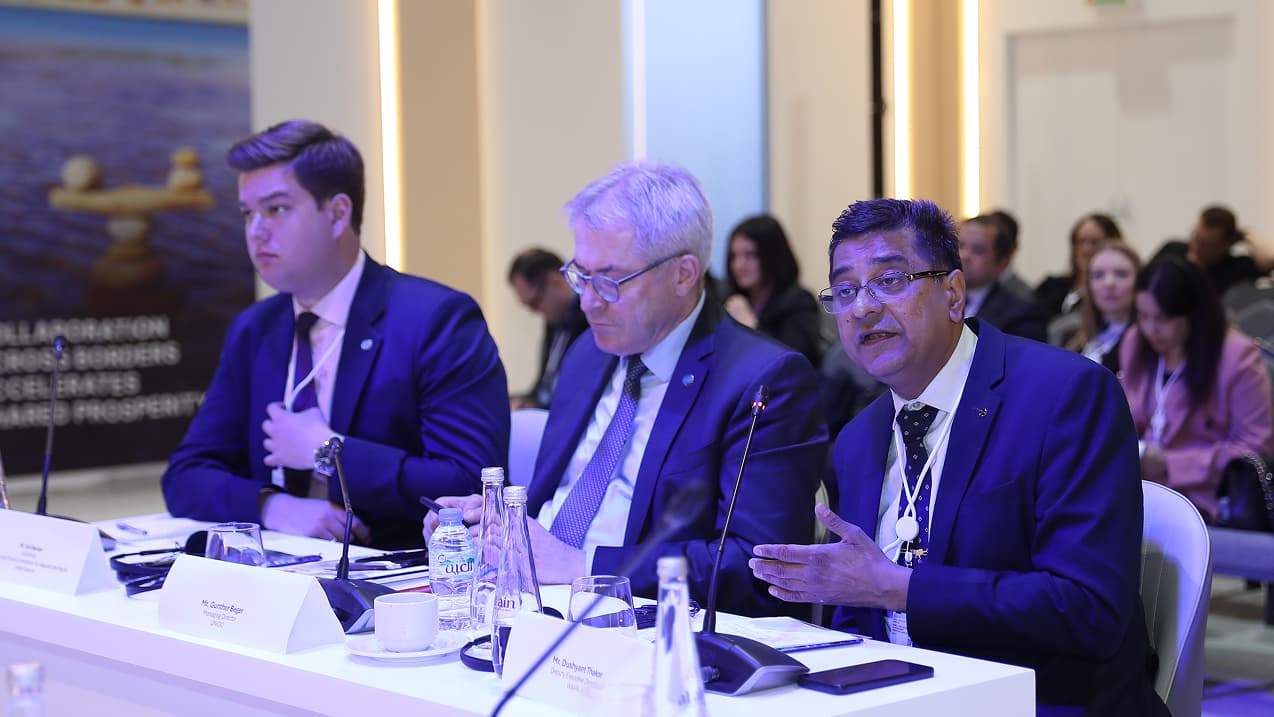Global Trade: Towards Economic Security
28 July 2025

Executive Summary
This policy paper presents strategic insights from the AIM Congress 2025 Chambers’ Roundtable on Global Trade: Towards Economic Security. It provides an integrated outlook on the role of Chambers of Commerce in navigating the future of trade and investment. From evolving regulatory landscapes to the rise of sustainability-focused clusters, this paper proposes tangible recommendations to foster stability, inclusion, and prosperity across global markets.
1. Context and Urgency
The global trade ecosystem is at a crossroads. The post-pandemic recovery, coupled with heightened geopolitical tensions, has catalyzed a rethinking of multilateralism and traditional trade alliances. Emerging economies are asserting influence while advanced markets are reinforcing regional preferences. The current context demands that chambers evolve beyond advocacy and into strategic enablers. Their involvement is critical to mitigate fragmentation, advance digital and green trade agendas, and align global stakeholders in a new era of economic cooperation.
2. Strategic Role of Chambers of Commerce
Chambers serve as the connective tissue linking businesses to governments, investors, and communities. Their neutral and apolitical positioning allows them to navigate both public and private spheres, ensuring effective policy design and inclusive dialogue. In this era of volatility, chambers must redefine their role as innovation accelerators, investment gatekeepers, and stewards of sustainability. Their platforms can unlock regional competitiveness through training, regulatory harmonization, and infrastructure investment.
3. Roundtable Participants
- Diane Ibrahima – Vice-President, Chambre de Commerce, d'Industrie et d'Artisanat de Guine
- Dr. Dmitry Kurochkin – Vice President, CCI RF
- H.E. Shamis Ali Al Dhaheri – Second Vice Chairman & MD, Abu Dhabi Chamber of Commerce
- Hilda Al Hinai – Secretary General, CASCI
- Humaid Ben Salem – Secretary General, Federation of UAE Chambers; Chair, ICC UAE
- Dr. Khaled Hanafy – Secretary General, Union of Arab Chambers
- Mpagi Stephen Joseph Kalibbala – Vice President, Uganda National Chamber of Commerce
- Pietro Rampino – Chairman, Joint Italian Arab Chamber of Commerce
4. Pillars of Discussion and Insight
4.1 Regulatory Challenges and Opportunities of 2025/2026
The principle of global free trade is being tested. Trade liberalization, once a cornerstone of economic growth, is facing resistance from national protectionist trends and unilateral regulatory shifts. Chambers must proactively engage in shaping modern, inclusive trade frameworks that reflect the realities of global supply chains and the needs of SMEs. They can advocate for the modernization of the WTO, regional trade alignment, and agile digital regulations that promote trust and reduce compliance burdens.
4.2 Cross-Border Trade and Investment
International trade is becoming more complex due to overlapping trade agreements, digital barriers, and logistical inefficiencies. Small and mid-sized enterprises face disproportionate challenges in navigating these complexities. Chambers can demystify trade compliance, connect exporters to relevant authorities, and streamline certifications. Their efforts to promote bilateral dialogue, shared customs infrastructure, and blockchain-enabled trade documentation can directly reduce friction and costs.
4.3 Investment Opportunities in Emerging Markets
Emerging economies are home to youthful populations, untapped resources, and expanding digital economies. Yet, they are often overlooked due to perceived risks. Chambers can bridge the trust gap by creating transparent platforms for investor engagement, curating investment pipelines, and coordinating diaspora finance. The development of special economic zones, innovation hubs, and targeted incentives will ensure these markets are positioned as competitive and future-ready.
4.4 Governance and Corruption
Persistent governance challenges—such as opaque procurement, weak judicial oversight, and institutional instability—deter long-term investment. Chambers of Commerce are uniquely suited to promote ethical standards across industries. By co-developing anti-corruption frameworks with government stakeholders, offering compliance certifications, and enhancing reporting mechanisms, they can elevate public trust and private sector confidence simultaneously.
4.5 Industry Clusters, Sustainability & Global Supply Chains
Industry clusters unlock innovation and job creation by creating dense networks of specialized businesses, universities, and accelerators. Chambers must prioritize cluster development around renewable energy, logistics, agribusiness, and technology. These ecosystems should be embedded with ESG principles to ensure resilience. In global supply chains, chambers can enable traceability, green certification, and capacity building that helps businesses meet evolving global buyer expectations.
5. Recommendations for Policymakers & Chamber Leaders
- Harmonize regional trade regulations and digital standards.
- Develop trade intelligence units within national chambers.
- Incentivize ESG alignment for exports and imports.
- Champion innovation funding and de-risking instruments for SMEs.
- Align national trade strategies with global sustainability goals.
6. Closing Remarks and Action Plan
The discussions at the AIM 2025 Chambers’ Roundtable affirmed that the future of global trade will depend on the ability of chambers to guide change across fragmented systems. The consensus was clear: economic security must be rooted in equitable growth, ethical governance, and strategic collaboration. BlkSculpt Capital recommends regional chambers now mobilize stakeholder consultations to validate these insights, launch the Chamber Innovation Fund, and circulate this paper to regulators, media, and multilateral entities to guide actionable outcomes.